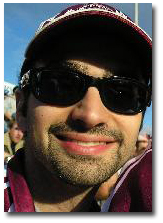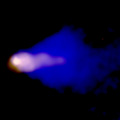An overview of the Chandra mission and goals, Chandra's namesake, top 10 facts.
Classroom activities, printable materials, interactive games & more.
Overview of X-ray Astronomy and X-ray sources: black holes to galaxy clusters.
All Chandra images released to the public listed by date & by category
Current Chandra press releases, status reports, interviews & biographies.
A collection of multimedia, illustrations & animations, a glossary, FAQ & more.
A collection of illustrations, animations and video.
Chandra discoveries in an audio/video format.
Chandra Chronicles Spotlight: Bryan Gaensler
December 15, 2005 ::
 |
| Bryan Gaensler, Assistant Professor of Astronomy at Harvard University |
The Chandra Chronicles Spotlight series aims to introduce various people involved in the Chandra X-ray Observatory to the website's visitors. Recently, the Chandra Chronicles sat down with Bryan Gaensler, an assistant professor of astronomy at Harvard University. Professor Gaensler originally came to the Harvard-Smithsonian Center for Astrophysics in 2001 as a Clay Fellow before joining the Harvard faculty in 2002. In 2006, he will taking up an Australian Research Council Federation Fellowship in Sydney, Australia.
When do you first remember getting interested in astronomy?
I actually don't remember a time when I wasn't interested in astronomy! Some of my earliest memories are reading simple books on the planets and on space. When I was 6, I even wrote an astronomy textbook for my school library!
Once you realized you liked the subject, what did you do to pursue it? Along those lines, when did you figure out that you wanted to become a professional astronomer?
I got my parents to buy me every book they could find on astronomy - especially ones on the solar system, since the 1970s was an exciting time for that with the Viking missions to Mars and the Pioneer fly-bys of the gas giants. I got a small telescope for my 5th birthday and a much larger one when I was 13. I also joined the astronomy club at my high school, which had regular viewing nights and organized an excursion to the country to see Halley's Comet in 1986. When my family got a home computer in the mid-1980s, I also got hold of various software packages which plotted the night sky and positions of the planets etc., and spent a lot of time playing with them.
I think I was about 11 or 12 when I found out that astronomy was more than a hobby, and that one could be a professional astronomer. I decided pretty much right away that this is what I wanted to do, although I wasn't quite sure what it involved. I had a vague vision that I would build my own observatory and would have to sleep in the day and work at nights, but other than that I wasn't too interested in the details!
How did you pick the sub-field of astronomy that you ended up in? How does X-ray astronomy play a role in this work?
When I was a junior in college, I applied for summer internships at observatories in Australia, and landed a job working on pulsars at the Australia Telescope National Facility in Sydney. While I knew what pulsars were before that, I wasn't especially interested in them. However, during that summer I got to spend many weeks searching for and studying pulsars at the Parkes Radio Telescope. When I could actually hear real pulsations thudding through the loudspeaker, I was hooked! Much of what I have done since has had at least some connection to pulsars. They continue to surprise us.
Many of the exciting results that have emerged since Chandra was launched have focused on pulsars and their surroundings. The surfaces of pulsars have temperatures of millions of degrees, and their extreme magnetic fields produce outflows of energetic particles. All of this radiates copiously in X-rays. So although I started out as a radio astronomer, it was natural to get involved in
X-ray astronomy once Chandra and XMM-Newton began taking all their wonderful images.
Astronomers -- at least ones that use ground-based telescopes -- travel a lot. Is that true for you and is it something you enjoy?
I actually don't do much actual observing anymore, and what I do do is carried out over the internet from my desk, or sometimes even from my laptop at home. I have plenty of enthusiastic students or postdocs working for me, so when there's a chance to go observing in Chile or Australia or New Mexico, usually I give one of them the chance to go.
Nevertheless, I still do travel a lot - but mainly for committee meetings, talks and conferences. I like to visit new places, but normally don't end up seeing much except the insides of meeting rooms, unfortunately.
What's your least favorite stereotype about astronomers or at least scientists in general?
It annoys me that people think that we don't have interests or opinions outside our work. It's frustrating that lawyers or doctors are generally regarded as well qualified to eventually go on to public service or politics, but scientists don't seem to be seen as having anything to contribute besides their research.
How many times have people mistook you for an "astrologer" when you told them your profession? Your reaction when it's happened?
It happens all the time. Once not long ago I was waiting in the front office of Harvard College Observatory to talk to the receptionist, when she answered the phone saying that this was the "Astrology Department"! Even though it annoys me internally when this happens, most people don't know the difference between astrology and astronomy, so I just quickly correct them and move on.
You're from Australia. What's your favorite: Australian rules football, American football? Cricket or baseball? (If you answer "cricket", then explain to us why the matches take multiple days ...)
Australian rules is something they play in the southern states of Australia, which is not where I grew up - I can't understand it at all. I like rugby a lot though, and have come to enjoy American football (it helps when your team is the New England Patriots and they win three Superbowls right when you first become interested in the game!). I am a huge cricket fan also, and have really become obsessed with baseball also in the last five years (mainly because it is a lot like cricket in many ways).
As to why cricket games last so long, who's in a hurry? Seriously though, a good match can be an edge-of-the-seat thriller for five full days. You need a few days to recover afterwards!
What's the thing you look forward to the most in the future for astronomy?
Even though it's not an area in which I work, I find the topic of extrasolar planets extremely exciting. Instruments are being designed and built which will eventually make actual images of Earth-like planets. It's hard to imagine the sort of things we will know about other worlds by the time that I retire several decades from now.
Excerpt from the AAS announcement:
The Newton Lacy Pierce Prize in Astronomy is normally awarded annually for
outstanding achievement, over the past five years, in observational
astronomical research based on measurements of radiation from an
astronomical object. It is given to an astronomer who has not attained 36
years of age in the year designated for the award. The recipient shall be
a resident of North America (including Hawaii and Puerto Rico) or a member
of a North American institution, stationed abroad. The Prize has been
awarded every year (except 1994) since 1974. Dr. Bryan M. Gaensler is
cited,
"For his work on the interactions between neutron stars and their
surroundings, which led to our appreciation of the wide diversity of
magnetized neutron stars."










